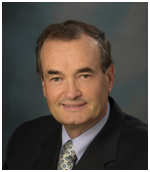【百家大讲堂】第170期:全球导航卫星系统挑战环境下的导航技术
来源: 发布日期:2019-03-12
讲座题目:全球导航卫星系统挑战环境下的导航技术
报 告 人:Emeritus Gérard Lachapelle
时 间:2019年3月14日(周四)9:00
地 点:信息科学实验楼902
主办单位:研究生院、信息与电子学院
报名方式:登录乐动(中国)微信企业号---第二课堂---课程报名中选择“【百家大讲堂】第170期:全球导航卫星系统挑战环境下的导航技术”
【主讲人简介】

Gerard Lachapelle教授是加拿大卡尔加里大学(University of Calgary)地理信息工程系无线定位研究领域的加拿大研究主席/信息学卓越圈(Informatics Circle of Research Excellence)主席。是IEEE Fellow、加拿大皇家学会院士、美国导航学会会士、加拿大工程院院士和英国皇家导航学会院士。
Gerard Lachapelle教授和他的PLAN (Position, Location and Navigation) Proup开发了许多与全球导航卫星系统(Global Navigation Satellite Systems, GNSS)相关的新算法、软件和专利,并获得了全球许可。自2001年在无线定位中取得了CRC/iCORE Chair以来,其研究还包括了新的GNSS信号处理方法、室内技术和新应用的发展。Lachapelle教授活跃于多个协会,2002-2003年曾任美国导航学会西部协会副主席。他曾获得过许多奖项,包括美国导航学会Johannes Kepler Award。
Professor Emeritus Gérard Lachapelle holds a Canada Research Chair/Informatics Circle of Research Excellence Chair in wireless location in the Department of Geomatics Engineering, the University of Calgary, Canada, where he has been professor since 1988 and Department Head from 1995 to 2003. From 1980 to 1988, he was Executive VP of Nortech (Surveys) Canada Inc. and Norstar Instruments where he directed GPS R&D programs, which resulted in the development of receiver technology that was subsequently taken over by NovAtel Inc in the late 80s. Since joining the University of Calgary, he and his PLAN (Position, Location And Navigation) Proup have developed numerous novel algorithms, software and patents related to Global Navigation Satellite Systems (GNSS) that have been licensed worldwide. Since holding a CRC/iCORE Chair in wireless location in 2001, this research also includes the development of new GNSS signal processing methods, indoor technologies and new applications. He holds degrees in geodesy and surveying engineering for Laval University, the University of Oxford, the University of Helsinki and the Technical University at Graz. Prior to 1980, he worked for five years as a geodetic engineer with the Geodetic Survey of Canada where he was involved in geodetic research and the Redefinition of the North American Datum, a joint project with the U.S. National Geodetic Survey. Professor Lachapelle has been active in numerous associations and was Western Vice President of the (U.S.) Institute of Navigation in 2002-03. He has received scores of awards for his work, including the Institute of Navigation Johannes Kepler Award in 1997 and fellowship of IEEE, the Royal Society of Canada, the Institute of Navigation, the Canadian Academy of Engineering and the Royal Institute of Navigation.
【讲座信息】
全球导航卫星系统主要用于卫星和接收天线之间无阻碍的信号传输。当视线部分或全部被阻挡,例如在树林中,在城市街道或在室内,信号会减弱并且会要么难以获取,要么受较大误差影响。报告会给出相关位置精度和可获取性降低的例子。轨道估计在上述条件下的影响被称作全球导航卫星系统测距法,以视线和非视线的例子阐明。其他系统和传感器既可用作在上述条件下全球导航卫星系统的补充又可作为替代。这些系统可以分为两大类,无线电频率和独立传感器。第一类包括地面信号,比如Wi-Fi,蓝牙和移动电话传输塔。由于误差的影响和发射器位置的变化,它们的使用和管理较为复杂。第二类由独立传感器(地磁传感器,加速器,陀螺仪,气压计,光学传感器)组成,主要用于大多数的移动设备,不仅提供位置还能测量用户的物理活动水平。
GNSS are designed primarily to operate under unobstructed signal transmission conditions between satellites and receiver antennas. When line-of-sight (LOS) is partly or totally blocked, e.g. under the forestry canopy, in city streets and indoors, signals are attenuated and become either unavailable or affected by large errors. Examples are provided to show related position accuracy and availability degradation. The effect of above conditions on trajectory estimation, called GNSS odometry, is illustrated through LOS and non-LOS examples. Other systems and sensors are used to either complement or replace GNSS in these conditions. These can be classified into two broad categories, namely RF and self-contained sensors. The first category includes ground signals such as WiFi, Bluetooth and mobile phone transmission towers. Their use and management are complex due to errors and transmitter location changes. The second category consists of self-contained sensors (magnetic, accelerometers, gyros, barometers, optical), now used in most mobile devices, not only to provide location but to measure the physical activity level of users.
报 告 人:Emeritus Gérard Lachapelle
时 间:2019年3月14日(周四)9:00
地 点:信息科学实验楼902
主办单位:研究生院、信息与电子学院
报名方式:登录乐动(中国)微信企业号---第二课堂---课程报名中选择“【百家大讲堂】第170期:全球导航卫星系统挑战环境下的导航技术”
【主讲人简介】

Gerard Lachapelle教授是加拿大卡尔加里大学(University of Calgary)地理信息工程系无线定位研究领域的加拿大研究主席/信息学卓越圈(Informatics Circle of Research Excellence)主席。是IEEE Fellow、加拿大皇家学会院士、美国导航学会会士、加拿大工程院院士和英国皇家导航学会院士。
Gerard Lachapelle教授和他的PLAN (Position, Location and Navigation) Proup开发了许多与全球导航卫星系统(Global Navigation Satellite Systems, GNSS)相关的新算法、软件和专利,并获得了全球许可。自2001年在无线定位中取得了CRC/iCORE Chair以来,其研究还包括了新的GNSS信号处理方法、室内技术和新应用的发展。Lachapelle教授活跃于多个协会,2002-2003年曾任美国导航学会西部协会副主席。他曾获得过许多奖项,包括美国导航学会Johannes Kepler Award。
Professor Emeritus Gérard Lachapelle holds a Canada Research Chair/Informatics Circle of Research Excellence Chair in wireless location in the Department of Geomatics Engineering, the University of Calgary, Canada, where he has been professor since 1988 and Department Head from 1995 to 2003. From 1980 to 1988, he was Executive VP of Nortech (Surveys) Canada Inc. and Norstar Instruments where he directed GPS R&D programs, which resulted in the development of receiver technology that was subsequently taken over by NovAtel Inc in the late 80s. Since joining the University of Calgary, he and his PLAN (Position, Location And Navigation) Proup have developed numerous novel algorithms, software and patents related to Global Navigation Satellite Systems (GNSS) that have been licensed worldwide. Since holding a CRC/iCORE Chair in wireless location in 2001, this research also includes the development of new GNSS signal processing methods, indoor technologies and new applications. He holds degrees in geodesy and surveying engineering for Laval University, the University of Oxford, the University of Helsinki and the Technical University at Graz. Prior to 1980, he worked for five years as a geodetic engineer with the Geodetic Survey of Canada where he was involved in geodetic research and the Redefinition of the North American Datum, a joint project with the U.S. National Geodetic Survey. Professor Lachapelle has been active in numerous associations and was Western Vice President of the (U.S.) Institute of Navigation in 2002-03. He has received scores of awards for his work, including the Institute of Navigation Johannes Kepler Award in 1997 and fellowship of IEEE, the Royal Society of Canada, the Institute of Navigation, the Canadian Academy of Engineering and the Royal Institute of Navigation.
【讲座信息】
全球导航卫星系统主要用于卫星和接收天线之间无阻碍的信号传输。当视线部分或全部被阻挡,例如在树林中,在城市街道或在室内,信号会减弱并且会要么难以获取,要么受较大误差影响。报告会给出相关位置精度和可获取性降低的例子。轨道估计在上述条件下的影响被称作全球导航卫星系统测距法,以视线和非视线的例子阐明。其他系统和传感器既可用作在上述条件下全球导航卫星系统的补充又可作为替代。这些系统可以分为两大类,无线电频率和独立传感器。第一类包括地面信号,比如Wi-Fi,蓝牙和移动电话传输塔。由于误差的影响和发射器位置的变化,它们的使用和管理较为复杂。第二类由独立传感器(地磁传感器,加速器,陀螺仪,气压计,光学传感器)组成,主要用于大多数的移动设备,不仅提供位置还能测量用户的物理活动水平。
GNSS are designed primarily to operate under unobstructed signal transmission conditions between satellites and receiver antennas. When line-of-sight (LOS) is partly or totally blocked, e.g. under the forestry canopy, in city streets and indoors, signals are attenuated and become either unavailable or affected by large errors. Examples are provided to show related position accuracy and availability degradation. The effect of above conditions on trajectory estimation, called GNSS odometry, is illustrated through LOS and non-LOS examples. Other systems and sensors are used to either complement or replace GNSS in these conditions. These can be classified into two broad categories, namely RF and self-contained sensors. The first category includes ground signals such as WiFi, Bluetooth and mobile phone transmission towers. Their use and management are complex due to errors and transmitter location changes. The second category consists of self-contained sensors (magnetic, accelerometers, gyros, barometers, optical), now used in most mobile devices, not only to provide location but to measure the physical activity level of users.
